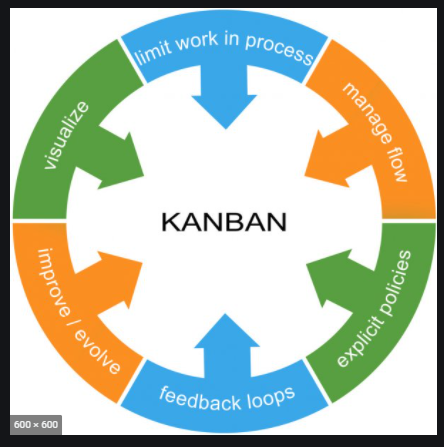Kanban Practices and Principles
- Description
- Curriculum

In today’s dynamic world, project management approaches need to be flexible and adaptable. Kanban, a visual method for managing work, offers a compelling alternative to traditional project management methodologies.
Kanban emphasizes continuous flow, WIP (work-in-progress) limits, and continuous improvement, making it ideal for projects with evolving requirements and a need for efficient delivery.
This comprehensive course equips you with the knowledge and skills to implement Kanban principles and practices effectively. We’ll delve into the core concepts, boards, workflows, and metrics of Kanban, and explore how to utilize Kanban for successful project delivery.
Whether you’re a developer, project manager, or anyone involved in managing tasks and workflows, this course empowers you to leverage the power of Kanban and optimize your work processes for continuous improvement.
Course Objectives:
- Gain a thorough understanding of the core principles and philosophies underpinning Kanban methodology.
- Explore the origins of Kanban and its connection to the Toyota Production System (TPS).
- Master the Kanban board as a central visual tool for managing workflow and visualizing work progress.
- Learn how to define and implement Kanban workflows with different stages (e.g., To Do, In Progress, Done).
- Understand the concept of WIP limits and their role in optimizing work flow and preventing bottlenecks.
- Develop skills for effectively managing Kanban boards, including card creation, prioritization, and status updates.
- Explore metrics used in Kanban to measure lead time, cycle time, and throughput to identify areas for improvement.
- Learn strategies for conducting Kanban retrospectives to analyze workflow efficiency and identify improvement opportunities.
- Analyze potential challenges and limitations of Kanban implementation.
- Understand how Kanban can complement other project management methodologies like Scrum and Agile.
Course Highlights:
Kanban Philosophy and Principles:
- Demystify Kanban methodology and its core principles of continuous flow, improvement, and respect for current processes.
- Explore the Kanban Manifesto and its emphasis on visualizing work, limiting WIP, managing flow, and continuous improvement.
- Analyze the benefits of Kanban in improving efficiency, reducing lead times, and adapting to changing demands.
Kanban Boards and Workflows:
- Master the Kanban board as a central tool for visualizing work stages and tracking progress.
- Learn how to define different stages in your Kanban workflow (e.g., To Do, In Progress, Done) based on your specific needs.
- Explore Kanban board customization options to optimize workflow visualization for your team.
WIP Limits and Flow Management:
- Understand the concept of WIP limits and their crucial role in controlling work in progress and preventing bottlenecks.
- Learn strategies for setting appropriate WIP limits based on team capacity and workload.
- Explore techniques for managing flow and ensuring smooth work through the Kanban system.
Kanban Practices and Techniques:
- Develop skills for effectively managing Kanban boards, including card creation, prioritizing tasks, and updating card statuses.
- Learn how to conduct Kanban meetings to discuss work progress, address roadblocks, and iterate on the workflow.
Kanban Metrics and Improvement:
- Understand key Kanban metrics like lead time, cycle time, and throughput used to assess workflow efficiency.
- Explore techniques for analyzing Kanban metrics and identifying areas for improvement.
- Learn how to conduct Kanban retrospectives as a team to reflect on the process, identify roadblocks, and implement changes for continuous improvement.
Target Audience:
- Developers, project managers, team leads, and anyone involved in managing tasks and workflows.
- Individuals seeking to improve personal productivity and time management.
- Teams transitioning from traditional project management methodologies to a more flexible approach.
- Software development teams exploring alternative approaches to Scrum for managing work.
- Anyone curious about Kanban and its application in various industries beyond software development.
-
1Nvidia New Technologies Slides
Welcome to your first slider tutorial. This slides will start with a simple introduction. Then, You will open up google cause I"ll show you where you can download the blender software and which version of it will we be using in the entire course period.
Note: The download link is available with the lecture, plus the .pdf file is also included for you to download if you still need help downloading the software.
-
2Engine Target Audience
-
3Quiz: Mobile / Native Apps
-
4Realistic Graphic on UE4
-
5Volta GPU for optimization.
The Tensor Core GPU Architecture designed to Bring AI to Every Industry. Equipped with 640 Tensor Cores, Volta delivers over 100 teraflops per second (TFLOPS) of deep learning performance, over a 5X increase compared to prior generation NVIDIA Pascal architecture.
-
6Deep Learning








